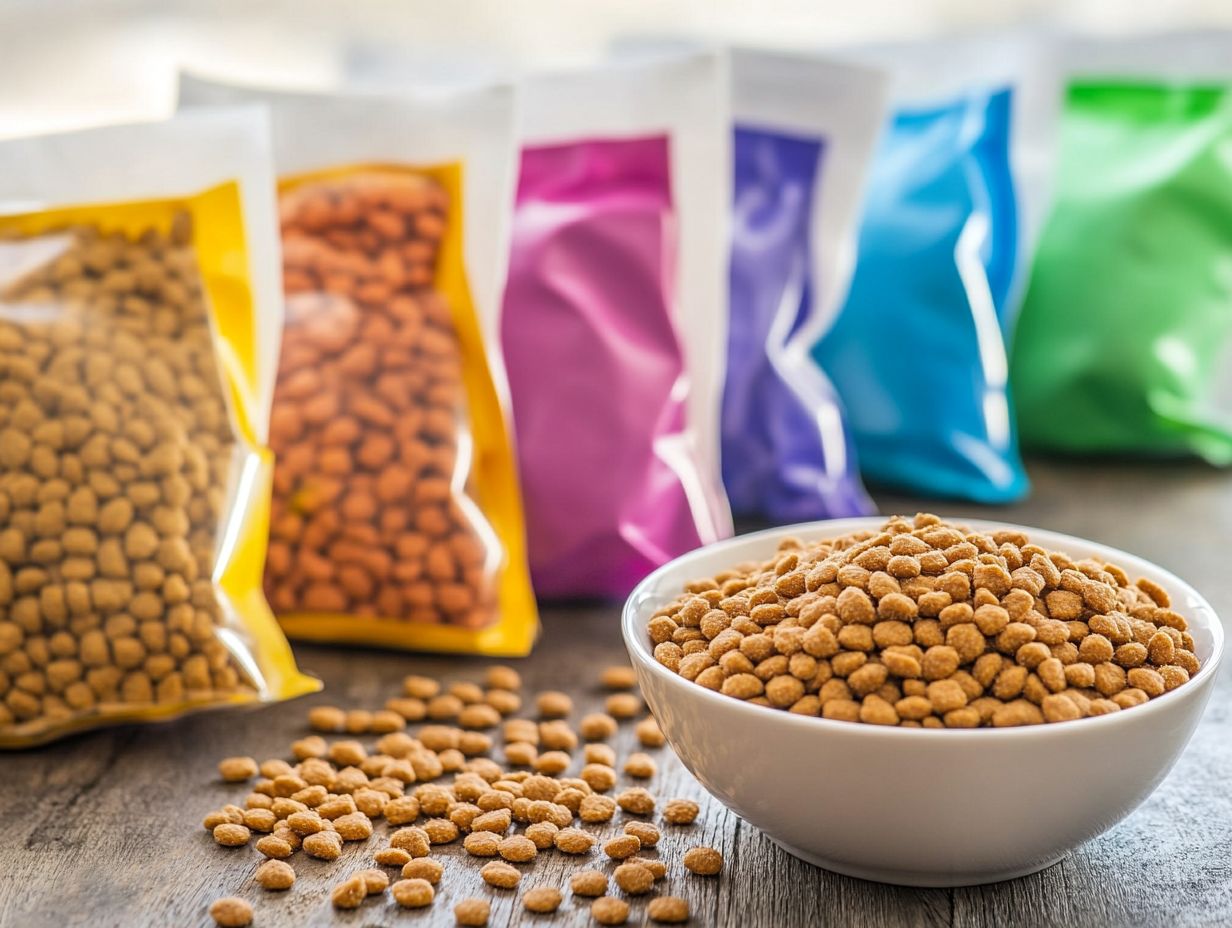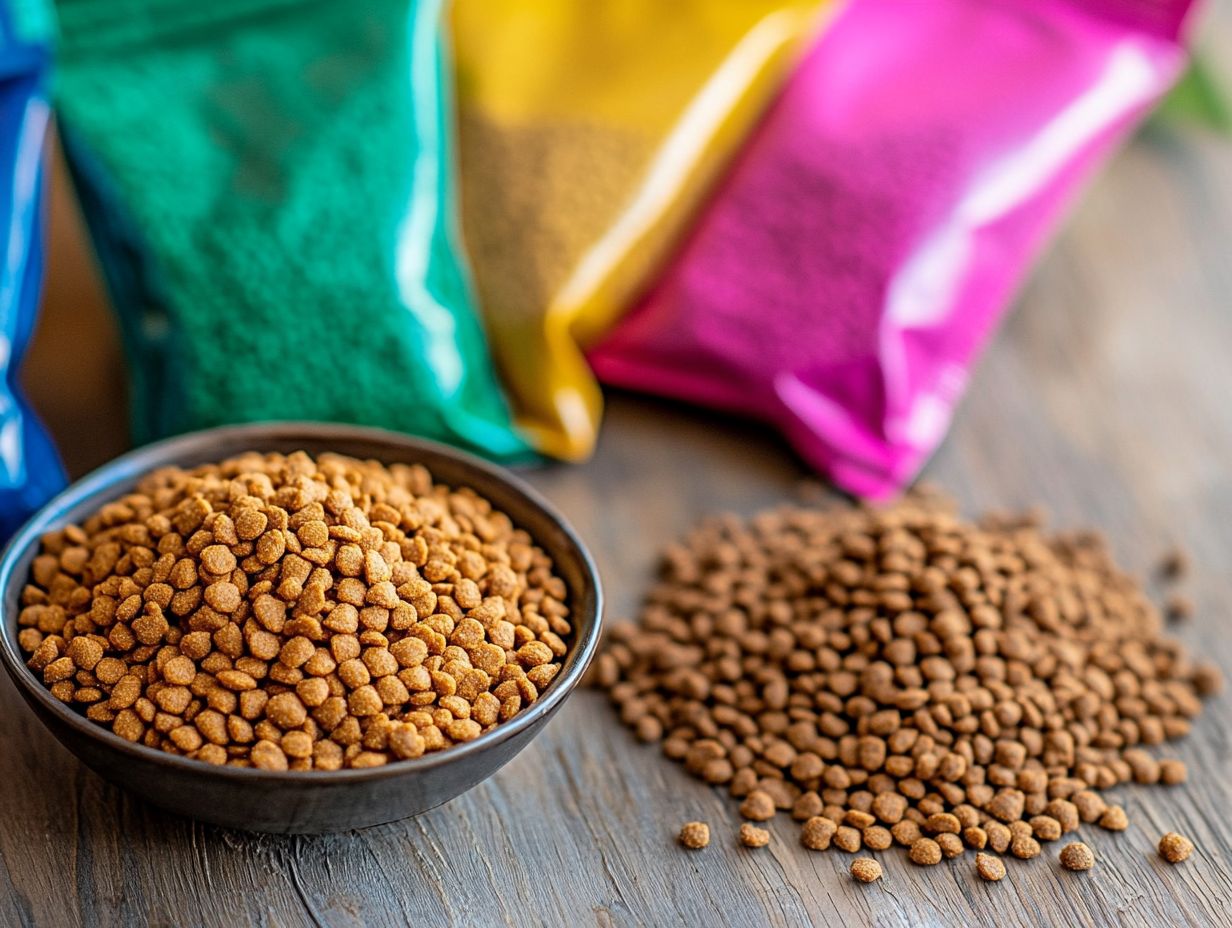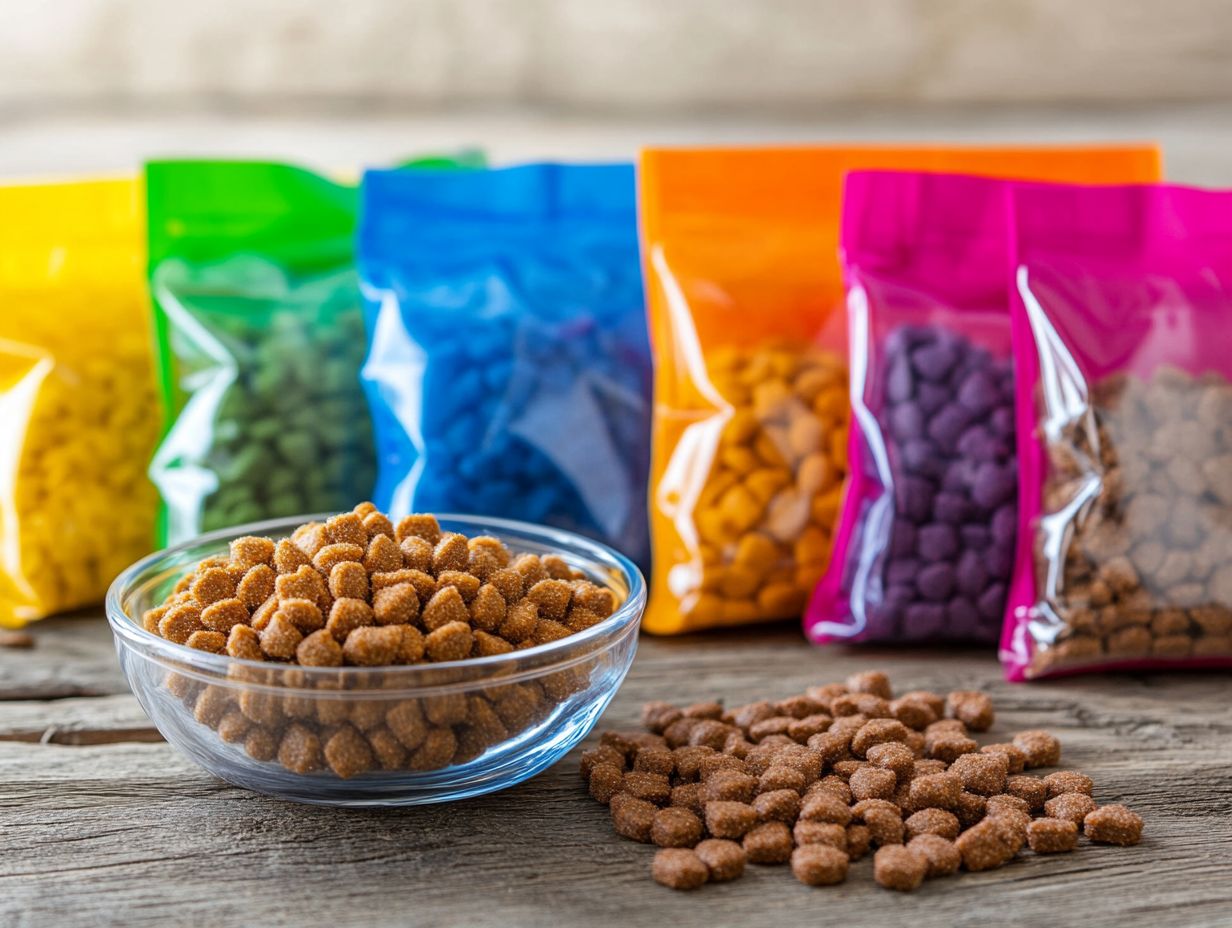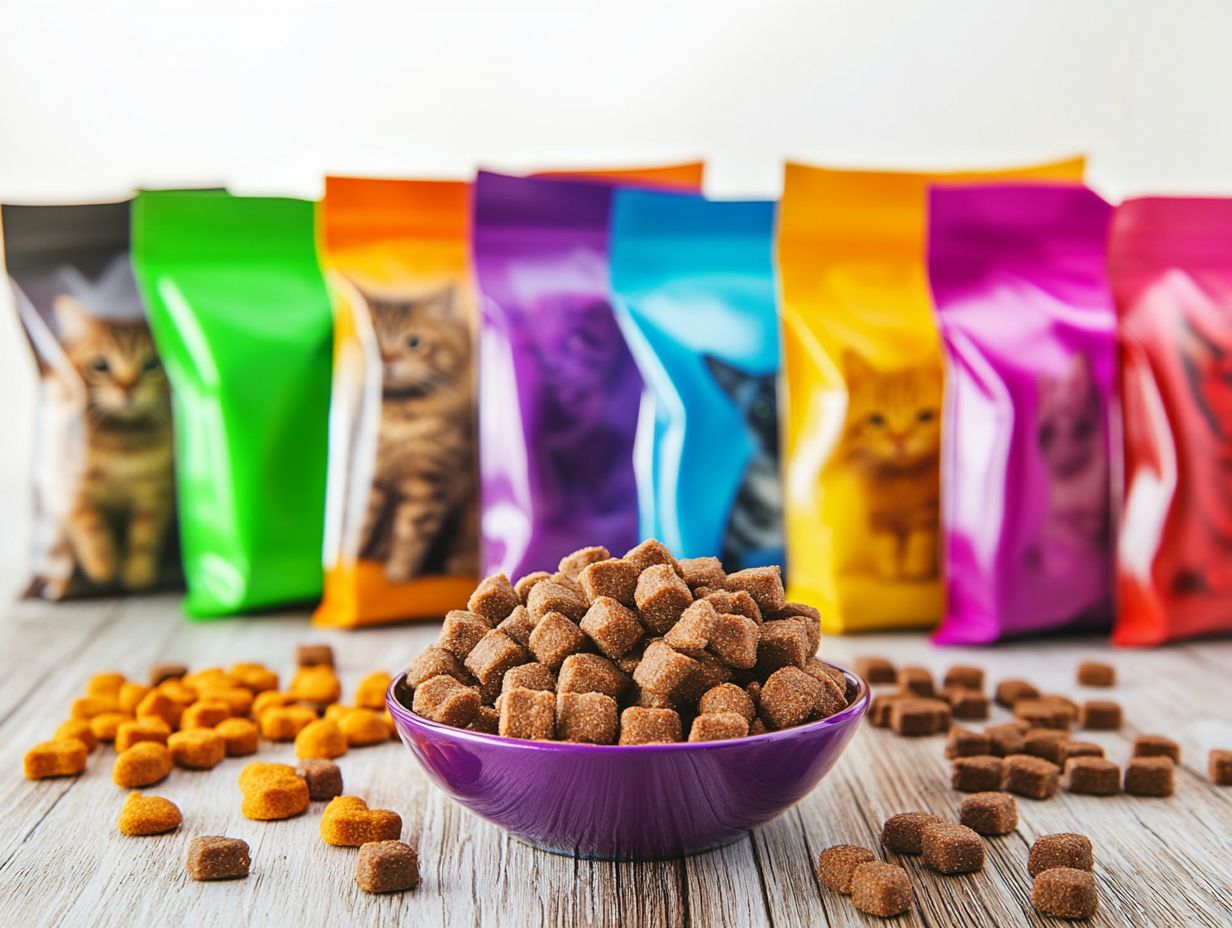If you’ve noticed your feline friend experiencing unusual reactions, they might be suffering from food allergies, which can often be linked to their diet or food intolerances.
Hypoallergenic cat food is designed to minimize these allergic responses, offering a solution for cats with protein sensitivities or food intolerances. However, it’s crucial to consult a veterinarian before starting such a diet, as self-diagnosing allergies can lead to potential risks.
This article explores what hypoallergenic cat food is, the causes and signs of cat allergies, and how specialized diets like a complete balanced formula can make a difference. We will also highlight some top-rated options, including the best hypoallergenic cat food brands, to help you make an informed choice for your furry companion.
Key Takeaways:

What Is Hypoallergenic Cat Food?
Hypoallergenic cat food is specifically designed to address the unique dietary needs of cats with food allergies and intolerances. This type of cat food usually contains hydrolyzed proteins, which are broken down into smaller molecules to reduce allergenic responses, as well as limited ingredients to help avoid common allergen triggers. It’s important to note that while hydrolyzed proteins can be beneficial, they may not be suitable for all cats, and nutritional deficiencies can occur if not managed properly.
Cat owners looking for the best hypoallergenic options should consult their veterinarian for recommendations and veterinary prescriptions. Reputable brands such as Hill’s Prescription Diet, Royal Canin, and Natural Balance, along with Blue Buffalo and Purina Pro Plan, offer balanced diets that support digestive and skin health. Prescription diets may be necessary for cats with severe allergies.
What Causes Cat Allergies?
Cat allergies can arise from food intolerances, environmental factors, and specific proteins that trigger adverse reactions. Common allergen triggers include grains (such as corn and wheat), dairy, and certain animal proteins (like beef and chicken), which can lead to inflammation and digestive issues, often resulting in inflammatory bowel disease or other sensitive digestive responses.
Identifying these allergens is crucial for creating a complete and balanced diet for cats without unwanted side effects. Environmental triggers like pollen, dust mites, and mold can exacerbate allergic reactions, leading to physical symptoms such as excessive scratching, sneezing, and respiratory difficulties, which may require dietary changes to manage.
Prolonged exposure to these allergens can compromise a cat’s health and comfort, potentially resulting in skin infections. Therefore, proactively recognizing and managing these potential allergens, including identifying the primary protein source and ensuring balanced nutrition in their diet, can significantly enhance a cat’s quality of life and overall well-being.
What Are the Signs of Cat Allergies?
Signs of cat allergies may include skin irritations, digestive issues, and respiratory problems. Symptoms such as excessive scratching, vomiting, diarrhea, and difficulty breathing are often associated with underlying food sensitivities or allergic reactions.
Cat owners should monitor these signs closely, as immediate veterinary intervention may be necessary for immune support and overall health. In addition to visible symptoms, these reactions can lead to behavioral changes in cats, such as irritability or lethargy, indicating a potential health issue. Early recognition of these symptoms can facilitate dietary and environmental interventions that help restore their normal digestive harmony. For those seeking suitable options, consider exploring Top-Rated Dry Hypoallergenic Cat Foods: Crunchy Options for Allergies. Alternatively, moist food versions can be considered for better palatability and sensitive digestive systems.
How Can Hypoallergenic Cat Food Help?
Hypoallergenic cat food can support cats with specific dietary needs by reducing exposure to common allergens and providing a balanced nutritional profile. This can help improve their digestive health, minimize allergic reactions, and enhance their overall quality of life.
For cat owners who suspect their pets may have allergies, a consultation with a veterinarian is essential for proper diagnosis and management. For further reading on this topic, consider resources that provide detailed information about feline allergies and dietary approaches.
Hypoallergenic cat food can be beneficial for managing cat allergies by offering a healthy diet that reduces allergic reactions and supports overall health. Hydrolyzed protein diets are particularly effective, as they help minimize allergen responses while promoting digestion and skin health. However, it’s important to consult with your veterinarian before making dietary changes, as hydrolyzed protein diets may not be suitable for all cats and could have potential downsides.
Furthermore, these diets often include omega fatty acids, which support immune function, making them excellent options for cat owners seeking to address food sensitivities. Ingredients like fish oil can enhance the skin and coat health of cats. Always ensure that the dietary changes align with AAFCO and WSAVA guidelines and recent veterinary research.
What Ingredients Should Be Avoided in Cat Food for Allergies?
The ideal cat food for allergies avoids common allergen triggers such as grains, dairy, certain proteins, gluten, soy, and artificial additives, as these can increase the risk of allergic responses. Minimizing or eliminating these ingredients is crucial. Additionally, cats with specific health conditions, such as kidney disease or diabetes, may have unique dietary restrictions and should be evaluated by a veterinarian.
Opting for gluten-free and limited ingredient diets can help address food sensitivities and provide a healthier meal for your pet. Avoiding fillers such as corn and wheat is also crucial, as these ingredients can lead to inflammation and gastrointestinal issues. Preservatives and artificial colors may cause skin irritations and worsen allergic reactions, necessitating high scientific standards in ingredient selection.
Moreover, cat food that emphasizes natural, whole-food ingredients can significantly enhance the overall well-being of furry companions. Proteins from sources such as rabbit or fish can serve as novel protein sources that are less likely to trigger allergies and meet a cat’s nutritional requirements. It’s also important to consider life stage; hypoallergenic diets for kittens, senior cats, and pregnant or nursing cats will differ in nutritional needs.
Implementing these strategies not only promotes better health but also improves the quality of life for sensitive cats, ensuring they lead an active and fulfilling life. Additionally, proper food storage and handling are essential to prevent spoilage and contamination, which can exacerbate allergic reactions.
What Are Some Common Hypoallergenic Ingredients in Cat Food?

Common hypoallergenic ingredients in cat food include single non-allergenic proteins such as hydrolyzed chicken protein, rabbit, and quail. These proteins are less likely to trigger allergic reactions while delivering essential amino acids and being easily digestible for sensitive cats. Ensuring the ingredients list meets high scientific standards is crucial for maintaining digestive health.
Omega fatty acids are included to promote skin health and support the immune system, making them a vital component of a well-balanced hypoallergenic diet. Ingredients like sweet potatoes and peas serve as healthy carbohydrate sources, providing fiber and energy without causing adverse reactions. Some brands also incorporate omega-3 and omega-6 fatty acids from fish oils or flaxseed, which help maintain a shiny coat and reduce inflammation.
By selecting appropriate hypoallergenic ingredients, pet owners can offer a nutritious diet that enhances their cat’s well-being while minimizing discomfort, leading to a more active and fulfilling life. Lastly, considering the ethical and sustainability aspects of protein sources can also be beneficial for conscious pet owners.
What Are the Top-Rated Dry Hypoallergenic Cat Foods?
Veterinarians recommend several hypoallergenic cat foods, including Royal Canin, Hill’s Prescription Diet, Purina Pro Plan, Blue Buffalo, and Natural Balance. These brands offer specially formulated options designed to effectively address cat allergies while adhering to AAFCO recommendations.
For those seeking limited ingredient diets for sensitive cats, both Natural Balance and Blue Buffalo provide options that exclude the most common allergens while ensuring proper nutrition. Additionally, some of these diets are available only through veterinary prescription.
1. Royal Canin Veterinary Diet Hydrolyzed Protein Adult HP Dry Cat Food
Royal Canin Veterinary Diet Hydrolyzed Protein Adult HP Dry Cat Food is formulated with hydrolyzed protein to minimize allergenic responses in cats. It is typically available only with a veterinary prescription, making it an excellent choice for cats requiring hydrolyzed protein due to allergies. Its palatable triangle kibble eases the transition to a new diet while delivering essential nutrients for overall health.
The protein content is broken down into smaller components to reduce the risk of allergic reactions. The specific blend of vitamins and minerals supports a healthy skin barrier and optimal digestion. For more information on suitable diets, check out this article on top-rated dry hypoallergenic cat foods.
2. Hill’s Prescription Diet z/d Original Skin/Food Sensitivities Dry Cat Food
Hill’s Prescription Diet z/d Original Skin/Food Sensitivities Dry Cat Food is specifically formulated for cats with food sensitivities and skin conditions. This diet supports immune health and alleviates clinical signs of food reactions, providing balanced nutrition tailored to sensitive felines.
Employing a unique blend of nutrients, it minimizes the risk of adverse reactions, facilitating easier digestion and nutrient absorption. This targeted nutritional approach is essential for managing food sensitivities in cats, helping maintain skin and coat health as well as overall well-being.
3. Purina Pro Plan Veterinary Diets HA Hydrolyzed Dry Cat Food
Purina Pro Plan Veterinary Diets HA Hydrolyzed Dry Cat Food is formulated with hydrolyzed protein to help manage food allergies. This veterinary diet is specifically designed for cats with food sensitivities and provides nutritionally balanced essential nutrition while avoiding problematic ingredients.
Hydrolyzed proteins minimize the risk of allergic reactions, allowing cat owners to promote their pet’s health with reduced allergen triggers. This diet includes vitamins and minerals that may help strengthen a cat’s immune support system, making it a healthy diet choice.
4. Natural Balance L.I.D. Limited Ingredient Diets Green Pea & Salmon Formula Dry Cat Food
Natural Balance L.I.D. Limited Ingredient Diets Green Pea & Salmon Formula Dry Cat Food features a single source of animal protein and easy-to-digest peas. This limited ingredient formula promotes digestion and skin health while being highly palatable.
The premium salmon provides omega fatty acids that support healthy skin and a shiny coat, beneficial for cats with protein sensitivities. The peas aid smooth digestion, minimizing the risk of discomfort and ensuring nutrient absorption, particularly for cats with sensitive digestive responses.
5. Blue Buffalo Basics Limited Ingredient Grain-Free Indoor Fish & Potato Recipe Dry Cat Food

Blue Buffalo Basics Limited Ingredient Grain-Free Indoor Fish & Potato Recipe Dry Cat Food is designed with fish as the primary protein source, making it a hypoallergenic option for cats with protein and grain sensitivities. This grain-free recipe offers balanced nutrition tailored for indoor cats, avoiding many common allergens.
How to Choose the Right Hypoallergenic Cat Food for Your Cat?
Choosing the best hypoallergenic cat food depends on your cat’s individual needs, preferences, and sensitivities. Consult a veterinarian to identify any food allergies and discuss dietary modifications for your cat’s well-being.
1. Consider Your Cat’s Allergies and Sensitivities
Assess your cat’s allergies and sensitivities to determine the most suitable hypoallergenic cat food. This process typically starts with a thorough examination by a veterinarian, who may suggest an elimination diet to identify specific allergens.
By collaborating closely with your veterinarian, pet owners can create a tailored dietary plan that ensures chosen hypoallergenic cat food provides necessary nutrients while avoiding harmful ingredients.
2. Check the Ingredients List
The ingredient list is crucial for selecting hypoallergenic cat food. Ideal products contain few ingredients, utilizing hypoallergenic sources and excluding common allergens. Consult with a veterinarian to avoid allergens effectively.
3. Look for a Limited Ingredient Diet
A limited ingredient diet minimizes exposure to common allergen triggers while providing nutritious meals. These diets typically emphasize a single non-allergenic protein source, making it easier for cat owners to monitor their pets’ reactions.
4. Consider Your Cat’s Age and Health Needs
When selecting hypoallergenic cat food, consider the age and health of the cat. Older cats or those with specific medical needs may require specialized formulas offering balanced nutrition, ideally under a veterinarian’s guidance.
Hypoallergenic options are crucial for preventing allergic reactions to additives in many common feline foods, ensuring that cats receive proper nutrition.
Frequently Asked Questions

What are the top-rated dry hypoallergenic cat foods for cats with allergies?
Some of the top-rated dry hypoallergenic cat foods for cats with allergies include Royal Canin Veterinary Diet Hypoallergenic Selected Protein, Hill’s Prescription Diet z/d Original Skin/Food Sensitivities, and Purina Pro Plan Veterinary Diets HA Hydrolyzed Formula, considered the best hypoallergenic choices available.
What makes these dry cat foods hypoallergenic?
These dry cat foods are hypoallergenic because they are made with limited and carefully selected ingredients that are less likely to cause an allergic reaction in cats, such as hydrolyzed proteins or novel protein sources.
Are all dry cat foods suitable for cats with allergies?
No, not all dry cat foods are suitable for cats with allergies. Some may contain common allergens, while others may lack the necessary balance of nutrients. It is important to consult with a veterinarian to determine the best hypoallergenic diet.
Do these dry cat foods still provide all necessary nutrients for my cat?
Yes, these top-rated dry hypoallergenic cat foods are formulated to provide complete and balanced nutrition compliant with AAFCO recommendations.
Are there any other benefits to feeding my cat a hypoallergenic dry food?
Aside from helping with allergies, hypoallergenic dry cat foods can improve digestive health and reduce skin irritations in cats. They may also benefit cats with sensitive stomachs.
Can I switch my cat to a hypoallergenic dry food without consulting a veterinarian?
It is always best to consult with a veterinarian before making significant dietary changes. They can help determine if a hypoallergenic dry cat food is suitable and provide guidance on proper transitioning and portion sizes.